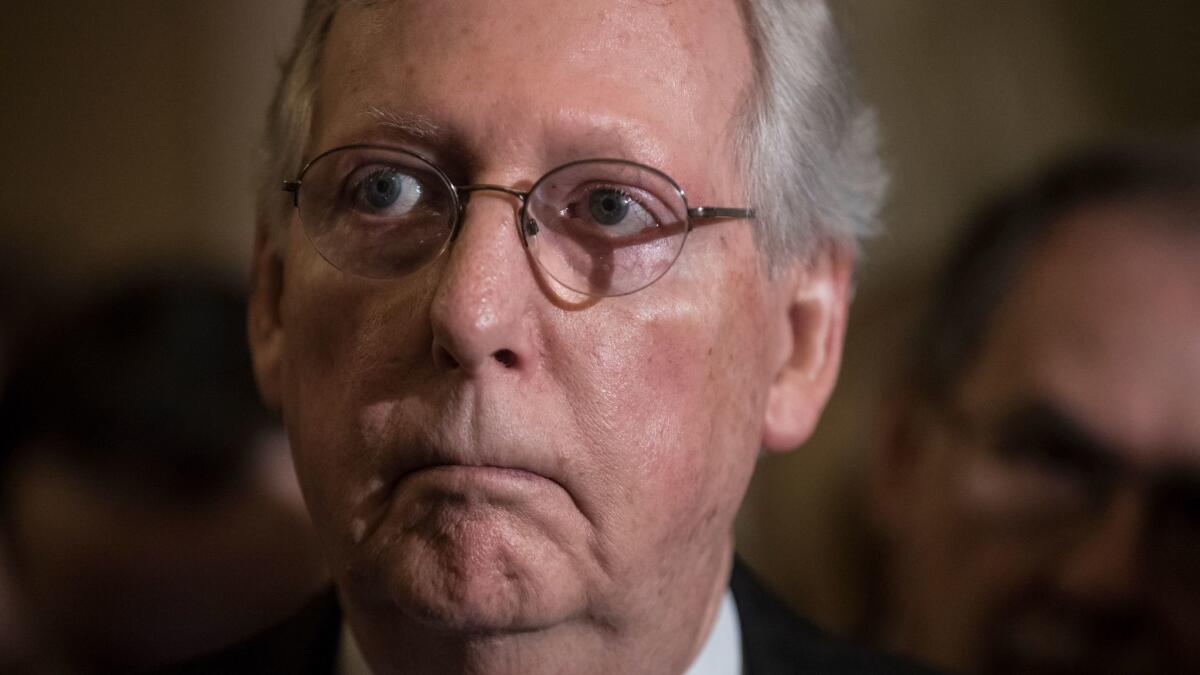Op-Ed: In a nasty push, Republicans want immunity for companies that negligently spread COVID-19

- Share via
It will happen, many thousands of times, and in every conceivable permutation: People will contract COVID-19 because of someone else’s actions and will seek compensation.
How should we handle such liability claims as a society? Mitch McConnell, gatekeeper of the Senate, has an idea. First, immunize all businesses. It would mean, as an example, that even if your boss fails to provide safeguards to protect you against the disease and as a result you get sick or possibly die from exposure on the job, neither you nor your family would be able to sue.
It’s a nasty and deeply callous idea, although not a surprising one for the Senate Majority leader or Republicans in general. Making it harder for individuals who claim harms from businesses to get compensated has been on the GOP’s wish list for years. It’s called tort reform — tort law covers a wide range of “personal injury” lawsuits against businesses (or individuals).
McConnell has signaled that COVID-19 corporate immunity is his “red line” for considering another much-needed economic stimulus package. In effect, he is holding hostage besieged state and local governments, which are targeted to receive up to $500 billion in aid in a package passed by the House in mid-May. McConnell has already made clear his willingness to let states go bankrupt rather than provide them federal assistance.
A black bird watcher, Christian Cooper, asked Amy Cooper to leash her dog in Central Park. Her racist meltdown is one for the ages.
Exactly what immunity would consist of hasn’t been spelled out, but the basic idea is that plaintiffs would need to show that companies either intended to put employees at risk or consciously disregarded a known hazard. That’s a high standard. Employers rarely set out to put workers in danger, but they often fail to take reasonable care to protect their workforce.
There should be no mistake about the effect of such immunity. It would transfer the enormous costs for potentially culpable conduct from businesses, which already enjoy limited liability and very favorable rules in the civil justice system, to victims or society as a whole. At the same time, it would sharply reduce incentives to minimize COVID-19 transmission.
McConnell’s insistence on immunity is telling: Even as he and many in the Trump camp are pushing for early reopening of all economic sectors, they are worried about the consequences. Why make immunity the hill to die on unless you reasonably fear that a spike in COVID-19 will follow from the return to more normal practices?
McConnell has pitched his ultimatum in the form of a familiar conservative bugaboo, greedy personal injury lawyers, whom he portrays as “already sharpening their pencils” to afflict corporate America with “an avalanche of lawsuits.” At the same time, McConnell extols the “heroic efforts” of companies who are guts-ing it out to open the economy.
It’s a strange notion of heroism. Most people would say that employees at a nursing home or in a meat packing plant are the gutsy ones. They may have to return to the front lines — or forfeit unemployment benefits — and risk contracting the virus.
Republican tort reform is too solicitous of business, but that doesn’t mean individual lawsuits are the best way to remediate the transmission of COVID-19. In fact, the tort system has substantial downsides when it is applied to harms of pandemic proportions.
It would, for example, produce a crazy quilt of recoveries nationwide. Similarly situated plaintiffs could get nothing at all or over-the-moon judgments, depending on individual juries, competence of counsel and location of suit.
It also would take far too long to provide meaningful compensation for people who need financial support immediately. Big personal injury cases typically take years to come to closure, in part because that is in the interest of the businesses being sued. And even if a worker could point to obviously reckless conduct by her employer, given the mysteries of COVID-19, she may be hard-pressed to convince a jury that the reckless conduct was the likely cause of her becoming sick.
Finally, the enormity of the pandemic, the uncertainty inherent in the tort process and the possible size of COVID-19 verdicts mean that costs to employers for liability insurance would be huge, another injury to the economy.
The problem of virus transmission is just too big to approach on a victim-by-victim, business-by-business basis. What’s needed instead is a legislative response along the lines of the congressional act that created a fund to compensate victims of 9/11. In exchange for a promise not to sue the airlines whose planes were weaponized in the attack, Kenneth Feinberg, a well-regarded mediation specialist, considered each loss and made awards from more than $7 billion set aside by Congress. To compensate COVID-19 victims, the money could come from the federal government but also from businesses and their insurance companies.
We cannot hope to give 100% compensation to everyone who will deserve it. But a 9/11-type fund could achieve rough justice in a lot less time, with more certainty than lawsuits. It would be light-years more fair than the corporate-immunity proposal McConnell wants to ram through Congress.
Harry Litman is a former U.S. attorney and the host of the podcast “Talking Feds.”
More to Read
A cure for the common opinion
Get thought-provoking perspectives with our weekly newsletter.
You may occasionally receive promotional content from the Los Angeles Times.










